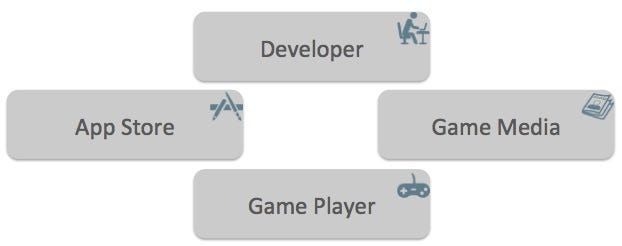
Featured Blog | This community-written post highlights the best of what the game industry has to offer. Read more like it on the Game Developer Blogs or learn how to Submit Your Own Blog Post
Can blood pressure medication teach us better game marketing?
Mobile game marketing has surprising parallels in pharmaceutical marketing. With multiple stakeholders, having diverse needs, who can make or break your product, focusing on users alone - certainly at the beginning - may not be a smart marketing strategy!

A version of this post appeared first in the zebugames blog.
 Like all developers, our view of the world is somewhat straightforward - we develop games for people who play mobile games (in marketing jargon end-users). So our view of the market is somewhat like the picture to the left. All good marketers focus on their end-users or consumers - what their needs are and what problems they need solved. So we too think about what would be of interest to our customers - our end-users or gamers. But the reality of game developers and gamers is not so simple, particularly for new and indie developers, as so many of us have found when trying to get traction for our games. We've done our share of trying to understand what other gaming studios have done to achieve traction and/or success. We also looked to our past to understand what has been done elsewhere that can help us in marketing our games. This lead us to look at how marketers in pharmaceutical companies tackle the matter of gaining traction.
Like all developers, our view of the world is somewhat straightforward - we develop games for people who play mobile games (in marketing jargon end-users). So our view of the market is somewhat like the picture to the left. All good marketers focus on their end-users or consumers - what their needs are and what problems they need solved. So we too think about what would be of interest to our customers - our end-users or gamers. But the reality of game developers and gamers is not so simple, particularly for new and indie developers, as so many of us have found when trying to get traction for our games. We've done our share of trying to understand what other gaming studios have done to achieve traction and/or success. We also looked to our past to understand what has been done elsewhere that can help us in marketing our games. This lead us to look at how marketers in pharmaceutical companies tackle the matter of gaining traction.
 Pharmaceutical marketers face a unique challenge. Their end-users, the patients rarely make purchase decisions on their own, particularly for prescription drugs. Doctors need to prescribe the medicine, the druggist at the store could recommend a generic alternative and patients (or in the case of kids, their moms or dads who make the purchase decision) may have their own brand preference or financial constraints. So it's not sufficient to run ads targeting the end user, but acquainting, educating and influencing the doctor (experts), pharmacists (gatekeeper, channel), and parent (economic buyer) is essential. To make things more interesting, each of these folks have very different concerns and motivations.
Pharmaceutical marketers face a unique challenge. Their end-users, the patients rarely make purchase decisions on their own, particularly for prescription drugs. Doctors need to prescribe the medicine, the druggist at the store could recommend a generic alternative and patients (or in the case of kids, their moms or dads who make the purchase decision) may have their own brand preference or financial constraints. So it's not sufficient to run ads targeting the end user, but acquainting, educating and influencing the doctor (experts), pharmacists (gatekeeper, channel), and parent (economic buyer) is essential. To make things more interesting, each of these folks have very different concerns and motivations.
This should all be very familiar to indie developers putting out mobile games. Discovery of their games is their single largest problem they face. Ideally if, like a doctor prescribing a medication, a major mainstream online or print reviewer writes about your game, it goes a long way for your end-users to discover your game. In order to get any outlets to cover your game - you need to stand out - whether in gameplay mechanic, design aesthetic or other key care-abouts they may have - such as market traction (talk about chicken & egg). Then, of course, the app stores - whether Apple, Google, Amazon or other - much like the pharmacists, act as gatekeepers. How they promote or feature, can make all the difference between your game thriving or dying an unheralded death. And even within the end users - the needs of those who're an otaku and likely to spend time & money on your game are different than the casual gamer who spreads the word. Suddenly the purchase decision or value chain for your mobile game doesn't look all that different from that of a pharma company trying to get its medicines sold.
Of course the value chain in both cases, whether for pharma companies or us as Indie developers, is rarely this linear but almost circular with all the players in the ecosystem interacting and influencing one another. 
Our takeaway from this is that our product needs to incorporate something for every one of these folks:
end users we still have to build the best game we can, but that's by no means sufficient
influencers it's critical to understand what's important to influencers - be it the media or other gamers - the example of Sensational December Machine as a way to get noticed has been cited before. Prune's design aesthetic is a great example of getting a good deal of ink while the gameplay itself is simple and straightforward.
gatekeepers understanding what the app stores look for to feature & support your game or app is critical and to engage with them well before your launch.
As talk of Indipocalypse abounds, it's important to learn from the lessons other marketers have learned not just within the gaming community but in other industries and incorporate, of course with appropriate modifications for our own specific cases.
About the Author(s)
You May Also Like







.jpeg?width=700&auto=webp&quality=80&disable=upscale)








